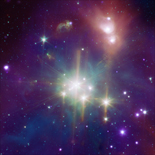
Coronet Star Cluster (NASA/CXC/JPL-Caltech/CfA)
Astronomy 307 - Spring 2010
INTRODUCTORY ASTRONOMY
TTh 11:00-12:30 · RLM 15.216B · Unique No. 49020
Professor
RLM 16.324 · (512) 471-3449 · email
Courses - Spring '10 | Course Website
APPROXIMATE SCHEDULE OF TOPICS AND READINGS:
|
Unit I: Observing the Sky |
ch. 1-6 |
1/19-2/11 |
|
Unit II: Solar System & Planets |
ch. 7, 8, & parts of 9-15 |
2/16-3/9 |
|
Unit III: The Sun and Stars |
ch. 16-22 |
3/23-4/8 |
|
Unit IV: Galaxies and the Universe |
ch. 23-26 |
4/13-5/4 |
IMPORTANT DATES FOR SPRING 2010 CLASSES:
|
First class day: Tues., Jan. 19 |
|
Last day of the official add/drop period: Fri., Jan. 22 |
|
12th Class Day (Last day to drop with a possible refund): Wed., Feb. 3 |
|
Last day to drop, except for documented non-academic reasons; also last day to change between letter-grade and pass/fail grading basis: Mon., Mar. 29 |
COURSE REQUIREMENTS AND GRADING POLICIES: My general philosophy regarding earning credit and determining your course grade is as follows:
Grades should be based on your individual performance, not on a "curve" driven by other students. For example, will be no quotas on A's or B's.
A significant portion of the grade will be based on sustained effort throughout the semester, such as on the regularly assigned homework, and on participation credits earned either in class or in certain pre-approved external activities.
The exams incorporate several different formats, including multiple-choice questions, short essays, and numerical problems. There will usually be some choice among the questions presented, for the latter two categories.
No individual make-up exams will be given for missed hour exams. Instead, I will offer two optional, more comprehensive exams, one at the middle and the other at the end of the semester, which will serve as make-up exams for the two halves of the semester respectively. These can also be taken voluntarily, as an opportunity to possibly raise your grade by replacing an earlier exam score.
GRADE ACCESS AND BASIS: You will be able to access your grades on specific assignments on your returned papers or via eGradebook, which will be updated frequently. The breakdown among different assignments will be as follows:
Hour Exams: 64%. There will be four regular in-class exams, each worth 16% of your grade. These will last less than the full class period (50 instead of 75 minutes). The format will be mixed, a combination of multiple choice, short essays, and numerical problems. Bring your own calculator; we will provide paper and a list of equations.
Most semesters, I use the official final exam time slot for an all-purpose makeup exam. By sheer (bad) luck, this semester our final exam time-slot is Sat., May 15, 7-10 PM. Although astronomers are used to working at night, I suspect that many of you will not find the concept of a Saturday evening final exam appealing. Therefore, I have decided to offer two make-up exams, one for each half of the semester. Each will serve as (the only) make-up exams for either of the hour exams in that half of the semester. Each exam, including each make-up exam, counts for 16% of the overall course grade.
|
Probable Dates for Regular Hour Exams (subject to change): February 11; March 4; April 8; and April 29 Probable Dates for Unit Make-up Exams: March 11 and May 6 |
Graded Homeworks: 20%. There will be 6 or 7 graded problem sets during the semester. The best 5 scores will count towards the homework total. You will have one week to complete each homework, with several opportunities to obtain help from the T.A. or instructor (see below). While you may discuss how to approach the homework with classmates and seek help if you need it, the work you turn in must be your own.